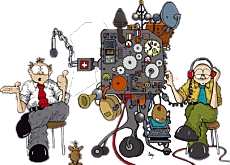Foreigners helped to speak the same language

Foreigners who speak fluent German often get a nasty shock when they come to Switzerland: they find they can't make head or tail of what the Swiss are saying.
But help is at hand in the form of an innovative language learning aid produced by Fribourg University. Hapless foreigners can not only learn to understand what is going on, but can have fun doing so.
They may at first be baffled even by the name of the course: “Chunsch druus?” is a way of saying “Do you understand?” It’s an expression which doesn’t exist in standard German. If it did, the first word – literally “you come” – would be “kommst”. No wonder foreigners tear their hair out.
Michaela Keryova, a German language student from Slovakia studying at Fribourg University has understood. Or, as the Swiss would say, she “chunnt druus”. She was delighted with her success when she asked for information in Zurich and got the answer in Zurich dialect.
“I understood him and found the street I was looking for,” she exclaimed.
It is just such everyday situations that the course aims to help with. The idea is to enable non-Swiss German speakers to “survive” through comprehension, without necessarily learning to speak the language themselves.
A guide to language and people
“Chunsch druus?” exploits a range of modern media possibilities to help people learn and practise Swiss German. It consists of a book in a practical travel guide format, a DVD, four CD-roms – and a licence giving access to a variety of on-line material.
“Our target public are people who know standard German and want to get around in German-speaking Switzerland,” project leader Raphael Bethele, a professor at Fribourg University’s Institute of Multilingualism told swissinfo.ch. These include French- and Italian-speaking Swiss as well as foreigners – especially Germans – living in Switzerland.
Real life
The examples are taken mainly from real life. They include news programmes and weather forecasts from Swiss television.
“We didn’t want to use artificial material, but rather to reflect the reality of German-speaking Switzerland,” explained Martin Müller, one of the co-authors.
Numbers are always a nightmare for foreigners. Müller quotes the example of a scene showing a customer wanting to pay in a restaurant. The price is “vierzehn” – in standard German clearly “fourteen”. But is it 14 in Swiss German too, or is it perhaps “four ten”, in other words, “four francs and ten cents”? Many a student will be grateful for the clarification.
One of the problems faced by foreigners doing battle with the language is that “Swiss German” is a misnomer. Depending on where they come from, the German-speaking Swiss do not all speak the same language. Swiss German is divided into a number of different dialects. But the course takes this into account. Students can choose between four different variants, the dialects of Bern, Basel, Zurich and St Gallen.
Painless learning
The course uses plenty of fun elements to help students master differences between Swiss German and standard German. They include virtual “pairs” cards and dialect songs by the well-known Bernese singers Mani Matter or Polo Hofer.
“This helps learners to formulate rules which they can then apply themselves,” said linguist and co-author Lukas Wertenschlag, who teaches German to foreigners at the law faculty of Fribourg University.
The authors have been keen to make things as easy and as much fun as possible. “You don’t have to sit at home over the computer, but can download the exercises onto an MP3 player and listen to them in the train or out jogging,” says Wertenschlag.
Making friends
But comprehension is not the only goal. “‘Chunsch druus’ is also designed to promote intercultural understanding, by making learners feel more at home in German-speaking Switzerland,” Müller explained.
Philippe Humbert, a French speaker from Fribourg, spent two years studying at Bern university. “The lectures in German weren’t a problem. But in the breaks, when the students spoke dialect, it was very difficult for me,” he told swissinfo.ch.
Having followed “Chunsch druus?” Humbert no longer feels left out. “I’m not embarrassed any more and it doesn’t bother me to ask if there’s something I don’t understand.”
Pleased as he is to be able to take part in ordinary conversation, some very simple words caught Humbert’s special fancy. “Schätzeli” (darling) und “äuä” (a very useful word to be used in practically any situation, as a question or an exclamation), are his favourites.
As for Keryova, she admitted that she had never laughed so much in a course as she had when using “Chunsch druus”.
Renat Künzi in Fribourg, swissinfo.ch (Adapted from German by Julia Slater)
Switzerland has four national languages, German, French, Italian and Romansh.
German is spoken by nearly two thirds of the Swiss population.
The spoken forms of the German of Switzerland and the German of Germany became differentiated in mediaeval times.
Spoken Swiss German is largely unintelligible in most of Germany.
There are three main German dialect divisions within Switzerland – although each spills over into the border areas of neighbouring countries.
About 20% of the population live in French-speaking Switzerland, mainly in the west of country, while a minority of about 6.5% are native Italian speakers in the Ticino region and 0.5% in southeastern Switzerland speak Romansh.
Standard, or “High” German, often called “written German”, is the language taught in Swiss schools.
As a result, many Swiss for whom German is not their mother tongue cannot speak Swiss German.

In compliance with the JTI standards
More: SWI swissinfo.ch certified by the Journalism Trust Initiative










You can find an overview of ongoing debates with our journalists here . Please join us!
If you want to start a conversation about a topic raised in this article or want to report factual errors, email us at english@swissinfo.ch.